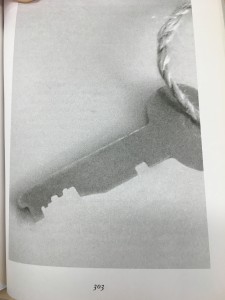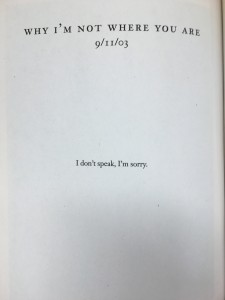Hi everyone,
I hope all of you guys are currently enjoying your reading break and catching up on rest! This past week our class focused on, American poet, Juliana Spahr’s this connection of everyone with lungs and 4 other poems we had to look over. All of the poems we read focused and revolved around the events of 09/11/01 as well as post 09/11/01. After reading over many of my classmate’s blog posts, most of them concentrated on imagery in Spahr’s poems along with some in text analysis.
To start us off, Paolina talked about the repetition and aftershocks of 09/11/01. She pointed out how the events of 09/11/01 led to the recurrence of news stations repeating images of “planes crashing into towers over and over again” and how everyone wanted it to end but no one could escape the damage that was done. There was no way of breaking free from the inter-web and news stations which had engulfed and connected everyone to the events of 09/11/01. The only thing that people could do was to “breathe the space between the hands and the space around the hands and the sapce of the room and the space of the building” (Spahr). Olivia later talked about Billy Collins poem, “Names”, and wondered whether if we knew that these four poems were related to 09/11/01 if we were not told. She later states that the “images of names inscribed on the stone and flesh and up in the air around buildings” is what gave it away. This connects to Paolina’s idea of repetition and how some images of 09/11/01 can trigger our memory of what we had seen from the past.
Erin does some critical in text analysis on Sphar’s poem involving awareness. She talks about one scene in the poem where there is a “Juxtaposition between lying in bed on a beautiful island to the atrocities being discussed through the world” and how the relationship between the two must be realized and dealt with. She criticizes Spahr for being an “eyewitness” to the news, that she is seeing and acknowledging what is going on but does nothing about the situation. Personally, this gets me very frustrated as it reminds me of people who sit behind their computer screens complaining about social problems within their society but choose to not take any action. She then connects this idea to the laziness within the American society. Erin digs a little deeper and even realized that the entirety of Sphar’s poetry within this connection of everyone with lungs has the phrase “I speak” rather than “I do” which I found very interesting since our contemporary world seems to be too focused on social media and celebrity gossip instead of being aware of real issues that are much more important and need to be dealt with.
On a side note, I found it very unique that Joseph turned his blog post for this week into his own little poem which I found extremely creative. Props to him for doing that and thinking outside of the box!
That is all for now, signing off.
Martin
http://blogs.ubc.ca/erinsblog/
http://blogs.ubc.ca/astu100josephmoric/
http://blogs.ubc.ca/oliveabellastu/
http://blogs.ubc.ca/pmbuck/


